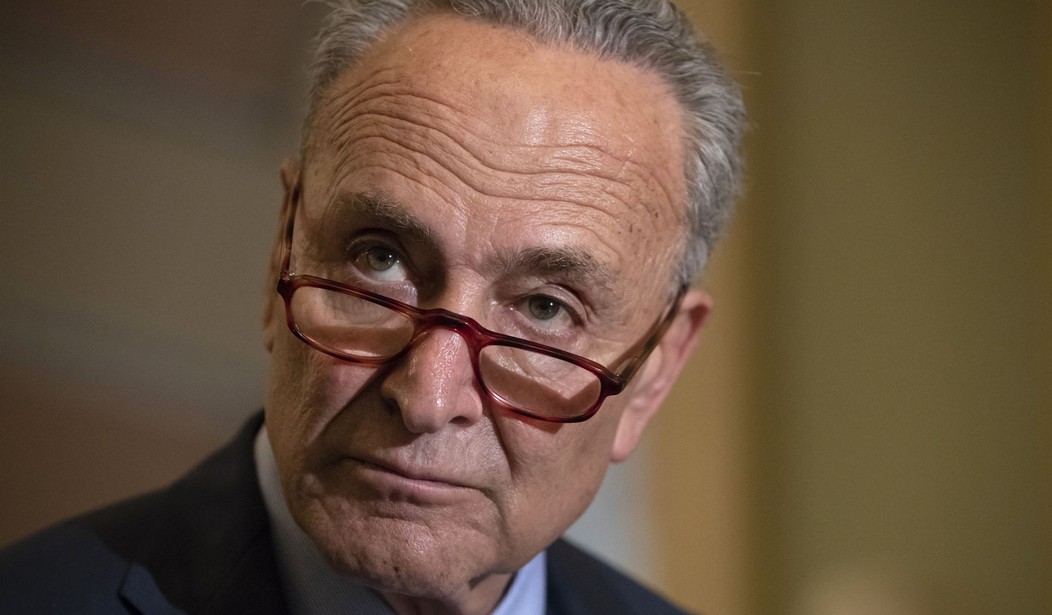In the wee hours of Wednesday morning, Senate Majority Leader Mitch McConnell came to the Senate floor to announce that, after days of filibustering, his Democratic colleagues had decided to 'take yes for an answer' on a bipartisan Coronavirus relief bill. Approval is expected this afternoon. On my radio show yesterday, I asked Sen. John Cornyn (R-TX) what he thought of my prediction that Democrats would win some relatively minor face-saving concessions, then trumpet a package that looked extremely similar to the bipartisan bill they'd helped shape over the weekend -- only to block it for valuable days over irresponsible, non-germane demands. He responded by saying that was a fair expectation. And it's exactly what's happened. Here's the Wall Street Journal's top line summary of what the "deal" entails:
The legislation, which congressional officials were set to continue to write throughout the early morning Wednesday, will provide direct financial checks to many Americans, drastically expand unemployment insurance, offer hundreds in billions in loans to both small and large businesses, and provide health care providers with additional resources as the virus spreads.
This passage literally could have been written about the Senate bill that was filibustered on Sunday. It did all of those things, including accommodating Democratic requests. What changed? With the caveat that it's still being patched together and written, it looks like the filibuster delay may led to the allocation of more money to the unemployment insurance pot, and added a layer of oversight protection for the corporate assistance portion of the bill:
A major challenge in the negotiations was roughly $500 billion in corporate aid, much of which will go toward backstopping Federal Reserve loans. The Treasury Secretary will have the authority to directly lend a slice of those funds, and Democrats had sought to place controls on the money. The agreement will create a new inspector general and oversight board to oversee the aid.
Democrats are also crowing about a provision that "bans businesses controlled by Mr. Trump, the vice president, members of Congress and heads of executive departments from receiving loans or other funds from the stimulus bill. Children and spouses of those people are also banned, according to a senior Democratic aid." I don't have a problem with this in general, but it seems obvious why Trump's opponents inserted it and are highlighting it. Sorry, service industry workers who happen to be employed by a Trump property. That's politics.
Recommended
In any case, a number of these 'concessions' could plausibly have been won without days of obstructing procedural votes. Yet with the pandemic raging and Americans losing their jobs by the millions, economists and experts across the spectrum agreed that time was of the essence. Senate Democrats -- with a destructive, pointless, and revealing cameo from Nancy Pelosi -- frittered away three days in order to achieve little:
Senior GOP source re Schumer’s take on the deal:
— Guy Benson (@guypbenson) March 25, 2020
- It’s the same bill “with marginal changes.”
- He’s “trying to take credit” for the structure he filibustered and delayed for “small ball” alterations.
- Face saving exercise, Dems realized this couldn’t drag on much longer.
It's very common for the opposition to put up a fight on big ticket legislation, marginally improve the final product by winning a few bullet points, then hailing those accomplishments in selling the final product to its partisan base. Standard operating procedure. But this isn't a standard or normal political moment. It's as urgent as it gets, with a deadly disease sweeping the world and huge swaths of the American economy on hold. Going through the 'usual' bickering process was irresponsible. I hope their minuscule "wins" were worth it. They have no choice but to say yes, but I wonder how many of them actually believe it. But what's done is done:
Look, how we got here is outrageous and the self-serving, face-saving spin is inevitable. But at least it’s happening. Workers and businesses have waited in limbo for days.
— Guy Benson (@guypbenson) March 25, 2020
Q: How fast can it pass the House? They’re out of town.
The answer, it seems, is not today. And if it's going to be soon, Pelosi reportedly wants to try a 'vote' by unanimous consent, because the House is out of session. I understand the urgency -- I've been calling for the Senate to move far faster than they did -- but (despite some pandemic precedent) I'm deeply uncomfortable with a $2 trillion spending bill being passed "unanimously" by an empty chamber, with representatives not actually voting on something they haven't read or debated. Even in a crisis, that strikes me as a terrible precedent. And what if someone objects?
This bipartisan deal is a raw deal for the people. It does far too little for those who need the most help, while providing hundreds of billions in corporate welfare, massively growing government, inhibiting economic adaptation, and widening the gap between the rich and the poor.
— Justin Amash (@justinamash) March 25, 2020
Could Senate Democrats have delayed this aid by three days, only to see the House squander even more time as members scramble to get back into town? Secure remote voting is an absolutely necessary no-brainer for rare moments like this. I'll have more thoughts on that tomorrow. I'll leave you with my takeaway from McConnell's floor speech minutes ago:
McConnell says he’ll leave it to others to compare bipartisan plan Ds filibustered for 3 days vs. what they’ve finally agreed to. Clear implication is that Schumer squandered lots of crucial time for marginal shifts. McConnell says political games are over & it’s time to vote.
— Guy Benson (@guypbenson) March 25, 2020

























Join the conversation as a VIP Member